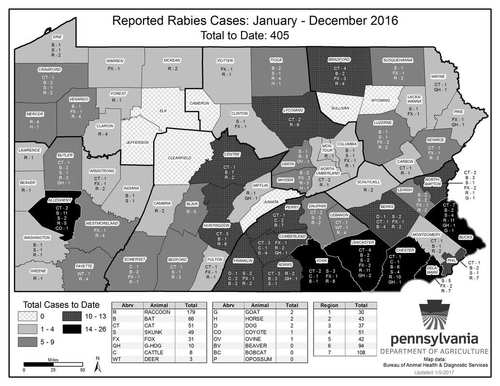How vaccines work:Legend has it that Albert Einstein once said, "If you can't explain it to a six-year-old, you don't understand it well enough." We could certainly get in-depth into the science of immunizations, but for simplicity's sake, here's an anyone-can-understand version:
How your pet's vaccines help protect your family: Some diseases are zoonotic, meaning they can be transmitted from animals to humans. In dogs and cats, the most common zoonotic concern is the Rabies virus. Rabies is a fatal disease, most often transmitted via bite wounds from an infected animal. It is a problem in Pennsylvania. According to data from the PA Dept. of Health, there were 405 Rabies positive animals submitted in 2016 (21 in Allegheny County). The most recently released data from June 2017 reports 154 Rabies positive animals statewide - in just one month. Keep in mind that the PADOH is only able to report these numbers based on animals that were submitted for testing. This does not include many more that die from the disease, undetected in the woods. The Rabies vaccine for dogs and cats is extremely effective, and is required for all domestic animals by PA state law (yes, they do go door-to-door and check). A common question from cat owners: "Pumpkin never goes outside; why does she still need a Rabies vaccine?" State law aside, indoor cats still need to be protected. Though their risk for exposure is much less than a free-roaming outdoor cat, take a look at the map above: bats are the second most common Rabies positive animals in PA. Most often, these are bats that have made their way into homes through chimneys or by other means. Cats are prey animals, and Pumpkin would be thrilled to finally get a chance to nab that "hairy bird" that just flew into her house. Not good if the "hairy bird" is actually a rabid animal. There is no "one-size-fits-all" vaccine regimen.There are many vaccines available for dogs and cats, but not every pet needs every vaccine. Our veterinarians recommend immunizations based upon your pet's lifestyle and environmental risk - this is one reason we spend extra time to ask important questions during your appointment. Vaccinations can be divided into "core" and "non-core" vaccines:
There are no silly questions!As your pet's medical providers, part of our job is to help you be a well-informed pet owner.
If you have questions about your pet's vaccines, the diseases they prevent, or anything else, please ask us! |
AuthorWrite something about yourself. No need to be fancy, just an overview. Archives
June 2023
Categories
All
|
|
HOURS BY APPOINTMENT
MONDAY - THURSDAY 9:00AM - 7:00PM FRIDAY 9:00AM - 5:00PM SATURDAY & SUNDAY CLOSED |
954 Perry Hwy
Pittsburgh, PA 15237 |
© Allegheny North Veterinary Hospital 2023
|
